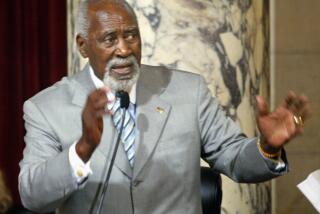Ron Brown Feared Dead in Crash
- Share via
WASHINGTON — A military jet carrying Commerce Secretary Ronald H. Brown and a delegation of U.S. corporate executives on a trade mission to the Balkans crashed into a hillside near the Croatian city of Dubrovnik in a driving rainstorm Wednesday. All 33 people aboard were presumed killed.
The Pentagon was unable to confirm the casualty toll because a U.S. military team had been unable to reach the remote crash site more than 10 hours after the plane went down.
Croatian television reported that a woman survived the crash and was taken to a hospital in Dubrovnik. But Irena Simovic, of the hospital staff, said the victim was dead by the time she arrived.
Working in the dark and rain, Croatian and NATO teams reportedly had pulled 10 bodies--seven men and three women--from the wreckage. The search effort was complicated by a heavy lacing of landmines in the area from battles in 1991.
The Pentagon said the T-43 Air Force jet, the military version of the workhorse Boeing 737, carried 27 passengers and a crew of six. The plane crashed while trying to make an instrument approach. Although it was only about 3 p.m., officials said the storm was so heavy that visibility was severely restricted.
The State Department said the families of those on board were notified by late Wednesday evening but that the passenger list would not be made public until sometime today to allow the families to grieve in private overnight.
However, some companies confirmed that their executives were aboard the plane, including Leonard J. Pieroni, chairman of Pasadena-based Parsons Corp.; Walter Murphy, a senior vice president at AT&T; Robert A. Whittaker, chairman of Foster Wheeler Energy International in Clinton, N.J.; and John A. Scoville, chairman of Harza Engineering Co. in Chicago.
Also believed aboard were Robert E. Donovan, president and CEO of ABB Inc. in Norwalk, Conn.; Claudio Elia, chairman and CEO of Air & Water Technologies Corp. in Somerville, N.J.; Barry L. Conrad, chairman and CEO of Barrington Group in Miami; Paul Cushman III, chairman and CEO of Riggs International Banking Corp. in Washington; and Frank Maier, president of Enserch International Ltd. in Dallas.
The New York Times also confirmed that its Frankfurt bureau chief, Nathaniel Nash, was a passenger.
President Clinton, joined by most of Brown’s Cabinet colleagues, attended an impromptu memorial service in the Commerce Department auditorium, telling department employees that the secretary was “one of the best advisors and ablest people I have ever known.”
He added praise for Brown’s entourage, saying: “To all of their loved ones and their families and friends, I want to say that I am very grateful for their lives and their service.”
Brown, 54, a canny politician who was one of Clinton’s earliest supporters, was among the highest-profile members of the Cabinet. He was in the Balkans on the sort of trip that has become his trademark in the Commerce post, taking U.S. executives on a mission to find ways to rebuild the war-torn region’s economy.
Lt. Gen. Howell Estes, operations officer for the Joint Chiefs of Staff, told reporters at the Pentagon that there was no evidence that the plane was shot down or crashed as a result of an on-board explosion. He said he would “rule out” the possibility that the crash was the result of any sort of hostile activity.
Estes insisted that the Air Force jetliner was following the same safety rules that govern civilian aircraft. But a U.S. official, joined by nongovernmental air safety experts, said the weather conditions were so bad that the plane probably should not have tried to land at the Dubrovnik airport, which has only a relatively primitive radio beacon system to assist landing aircraft.
Tragic Conditions
“The weather really was a major factor, perhaps so much so that the plane should not have been flying,” said a U.S. government official, who spoke on the condition of anonymity.
Because of the airport’s limited instrument facilities, pilots are required to have a clear view of the runway from 1.9 miles out and must be able to see the ground from 1,632 feet up before they can descend farther to land.
Visibility when Brown’s plane was attempting to land was reported to be far below those minimums--about 5/8 mile of visibility, with a cloud ceiling only 300 feet above the runway.
Airliners regularly land under such conditions at major airports in the United States and Europe, where more sophisticated equipment is available.
Pentagon and State Department officials said Brown’s plane had been expected to complete the 45-minute flight from Tuzla, the base for U.S. peacekeepers in Bosnia, a little before 3 p.m. local time.
Peter Galbraith, U.S. ambassador to Croatia who had been at the airport to greet the Brown party, reported to the State Department that the plane was missing about an hour after it was supposed to have arrived.
Remote Site
Early reports of wreckage in the Adriatic Sea led the U.S. military on a two-hour wild goose chase as helicopters scanned the sea for the plane. Estes said that Croatian officials later reported finding the crash site about 1.8 miles away from the airport at the top of 2,300- foot-high Sveti Ivan (St. John) Hill.
State Department spokesman Glyn Davies said Croatian police, already in the area, reached the crash site, but U.S. officials had to struggle on foot from Dubrovnik to the scene because the weather was too bad for helicopters and there are no roads.
U.S. special forces personnel flew from Brindisi, Italy, to begin a search-and-rescue mission and were joined by teams from other nations.
A U.S. military emergency team has also been assembled at Tuzla to assist in rescue and recovery, and was scheduled to travel to Split, Croatia, where the weather appeared to be better, and then travel by land to Dubrovnik. About 50 U.S. personnel were already at the Dubrovnik airport, having arrived by helicopter, Estes added.
The U.S. Air Force chief of staff appointed an accident review board to investigate the crash. The board will be headed by Brig. Gen. Charlie Coolidge. The National Transportation Safety Board has also agreed to provide four of its experts to assist in the investigation.
Estes said the Air Force, which uses the T-43 primarily for training navigators but also has some for passenger use, has not reported any recent problems with the aircraft.
Off the Flight Path
The plane that crashed had about 17,000 flying hours, below the normal range of 30,000 to 50,000 hours for other 737s of comparable age. It had received a full maintenance inspection in June 1995, and has had a series of regular inspections since.
However, Estes acknowledged that the crash site seemed to be off the normal flight path for an instrument landing at the Dubrovnik airport.
Although Clinton insisted that he would not give up hope until Brown’s death is confirmed, he clearly acted like a man mourning a close friend. Before his appearance at the Commerce Department auditorium, Clinton visited Brown’s wife, Alma, and other members of the secretary’s family.
Clinton’s comments to department employees, including a moment of silent prayer, had all the earmarks of a eulogy.
The president said he asked Mrs. Brown what he should tell the department’s staff. “She said: ‘Tell them Ron was proud of them, that he liked them, that he believed in them, and that he fought for the Commerce Department. And tell them that you’re going to do that now,’ ” Clinton said, to thunderous applause.
“Every American should be grateful that at a very difficult moment in our nation’s history, he made this Commerce Department what it was meant to be: an instrument for realizing the potential of every American,” the president said.
But conservative Republicans who are trying to abolish the Commerce Department insisted that Brown’s death would not change their opinion that the department is a wasteful and needless bureaucracy.
“A tragedy like this certainly doesn’t change one’s opinion on an important issue,” said Rep. Joe Scarborough (R-Fla.), a leading critic of the agency. “We’re all steadfast in believing that the Commerce Department continuation is not in the country’s best interest. But that doesn’t take anything away from Ron Brown’s work and Ron Brown’s belief.”
Time With Troops
Before boarding the ill-fated flight, Brown spent most of the day with U.S. peacekeeping troops in Tuzla. He said he hoped that he and the business executives in his party would be able to spur the reconstruction of war-torn Bosnia-Herzegovina.
“I’m really exhilarated by what we’ve seen,” he said, according to the Associated Press. “This is really a historic visit, moving from peacekeeping--from being the guardians of peace--to being in the vanguard of the effort to reconstruct and to develop Bosnia.”
Brown’s first stop Wednesday was Camp Guardian, six miles west of Tuzla, where the U.S. military has its headquarters. He went through the breakfast line with soldiers and chatted with them over ham and eggs.
Later he visited a tent city housing about 25 U.S. troops in the demilitarized zone separating Bosnian Serb and Muslim-Croat forces 16 miles east of Tuzla.
In Los Angeles, the City Council adjourned in memory of Brown and the business people who were traveling with him.
“Secretary Brown was a loyal, dedicated, patriotic American,” Councilman Nate Holden said. “He got involved in politics and did not complain about what was wrong with our system, but tried to correct it.”
At a morning press conference, County Supervisor Zev Yaroslavsky praised Brown as a man of action who helped the city recover from the devastating 1994 Northridge earthquake.
The Associated Press reported from Velji Dol, Croatia, the village closest to the crash scene, that reporters could see the plane resting on its belly on the top of a rocky hill. The plane’s middle was burned.
Village residents said the plane crashed during one of the worst storms in decades. A strong wind from the south raged all day through Dubrovnik, a picturesque and historic port. No ships left port all day because the wind was so strong, local officials said.
‘Very Strange’ Sound
Ivo Djuricic, 53, was on the hill behind his house when he heard the plane overhead. “It was very strange to hear it,” he told the Associated Press, “because planes never fly above here.”
He climbed up the hill until he saw the plane “in large pieces, loosely together.” Then he said he ran back, jumped in his car and raced to the village to call police.
Beyond the personal tragedy, the Brown crash is a devastating blow to attempts to promote the repair and reconstruction of a country wrecked by war. It comes at a delicate moment in efforts to attract investment and raise money--just days shy of a crucial donors’ conference--and could spook those who already had many doubts about whether Bosnia is worth the time and money it needs.
“The visit was trying to send a positive message about the future of Bosnia-Herzegovina,” said a U.S. official in Sarajevo involved with the Brown trip.
Instead, the message for many may well be that Bosnia is still a treacherous place, even if the crash is attributed to weather problems that are not exclusive to Bosnia.
In Sarajevo, Brown and his delegation were scheduled to meet today with an impressive array of business and political leaders and were to concentrate on specific sectors, such as telecommunications, roads and railways.
It was the first high-level U.S. business delegation to travel to Bosnia since the Dayton, Ohio, accords last year ended nearly four years of war.
Significant Delegation
Brown and his entourage, in addition to meeting with government and business leaders, were to hold a “town hall” meeting with students from local colleges of business and economics to discuss reconstruction.
“It was the most significant delegation from U.S. business and commerce to come to the region and especially Bosnia,” said Bosnian Ambassador to the United States Sven Alkalaj, who helped organize the trade mission. Alkalaj was in Sarajevo awaiting the delegation.
Weather has been turbulent in the Balkans for several days, including a snowstorm Wednesday in Zagreb, rain throughout Croatia most of the week and unusually strong winds in much of the region. U.S. Assistant Secretary of State John Kornblum had to delay a flight into Sarajevo by one day, and numerous other flights have been canceled, U.S. officials said.
Times staff writers Tracy Wilkinson in Sarajevo, Dick O’Reilly and Jodi Wilgoren in Los Angeles, and Doyle McManus and Elizabeth Shogren in Washington contributed to this story.
* MISSING CHIEF: Parsons Corp. employees are left stunned by loss. D1
* RELATED COVERAGE: A5, A6, A8, D1
More to Read
Sign up for Essential California
The most important California stories and recommendations in your inbox every morning.
You may occasionally receive promotional content from the Los Angeles Times.










